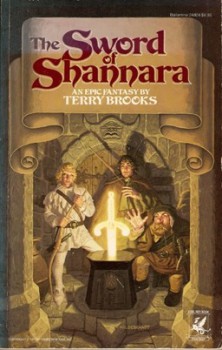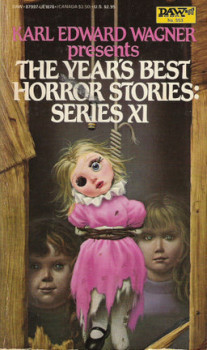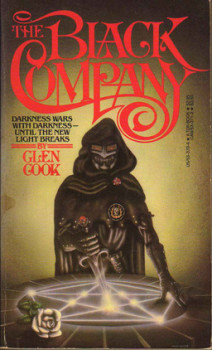Why I’m Here – Part One

A couple of times this past summer I felt really old. Somehow the classic sci-fi/fantasy books I grew up reading weren’t well known to younger readers (really, you don’t know who Manly Wade Wellman is?!?) or even all that important anymore. In the forty-year span of my sci-fi and fantasy reading life, the genres’ audiences had changed.
Now you could be a sci-fi reader without having read Dune or planning to ever read it. Roger Zelazny’s Chronicles of Amber was “shockingly discordant and unsatisfying to actually read all the way through.” This was nuts — cats-and-dogs-living-together nuts.
After my brain stopped spasming and cooled off a little, I started to actually think. Sure, there are certain — I’d say canonical — books important to the development of fantasy and sci-fi. But if you haven’t read them will somebody revoke your fandom card? If you don’t like the books I like, does that make you less discerning than I? I doubt it.
Besides, discerning is not a word I’d use for a lot of my own book choices. I mean, there’s a certain Lord of the Rings ripoff homage published by Ballantine in 1977 that I, along with the whole fantasy-reading audience, went nuts for. (You had to be there when fantasy pickings were meager.) I still love The Sword of Shannara today. It doesn’t get less discerning than that.

Growing up in the 1970s and 80s books were really the only substantive source of science fiction. Most genre movies and TV shows might have used the trappings of sci-fi, but their plots and concerns had more to do with that of the 30s than what was being written in the 70s and early 80s. Star Wars didn’t update adventure sci-fi but C.J. Cherryh’s Downbelow Station sure did. Even ostensibly more serious fare like Star Trek and Silent Running, though enjoyable, are pretty terrible as science fiction.
Fantasy was even more restricted to books if you wanted something good. The Rankin/Bass and Ralph Bakshi takes on J.R.R. Tolkien were interesting, but ultimately disappointing. Most fantasy movies were like the cheesy (albeit wonderfully so) Hawk the Slayer, not the rare, stolid film like Dragonslayer.
TV fantasy was limited to some lousy Saturday morning cartoons and reruns of Bewitched. My friends and I gobbled up every single movie and TV show that was the slightest bit fantasy- or sci-fi-tinged, but they were mostly thin gruel with little real love or knowledge of the genres they claimed to belong to.
When I was ready to move beyond Tolkien there were Patricia McKillip, Robert E. Howard, and Ursula K. Le Guin. If I wanted thoughtful space opera I could read Poul Anderson or H. Beam Piper. For fantasy I had dozens of Michael Moorcock books to choose from.
There was nothing outside of books that contained the strangeness of Cordwainer Smith or the anger of Harlan Ellison. My friends and I passed books from one to another like contraband.
Until my teen years most of the books I read came from my parents or my friends. Sure, I found books on my own in the public library or the local used bookstore, but the great majority of what I read I was hipped to by other people. If my dad hadn’t had a copy of Conan the Warrior in the attic I might never have read it. (Okay, unlikely, but possible.)
I read Gordon Dickson and Christopher Stasheff because my dad thought I’d like them. A whole bunch of friends practically demanded I read Roger Zelazny’s Lord of Light. The same friend, Carl, who gave me Godstalk, also ignited my long love of Terry Pratchett and Glen Cook. The biggest influence D&D had on my life was to increase my circle of friends, which meant even more book suggestions.
 Later, I started reading reviews in magazines like Analog or annual anthologies like DAW’s The Year’s Best Horror. As my personal preferences evolved I was more willing to take chances on unknown books and authors.
Later, I started reading reviews in magazines like Analog or annual anthologies like DAW’s The Year’s Best Horror. As my personal preferences evolved I was more willing to take chances on unknown books and authors.
Still, even then, much of what I read was based on the reviews of critics like Spider Robinson and Karl Edward Wagner. I’d love to be able to look back through the decades and recollect what led me to read every book I read.
Though I consider myself a serious fantasy and sci-fi fan, there are stacks and stacks of classic books I’ve never read or have even considered reading. Slan, nope. Left Hand of Darkness, nope. The Worm Ouroboros and Voyage to Arcturus both remain on my shelves, sadly unread.
There are so many books and so little time, so you have to pick some and ditch some. Sometimes it’s not even an active choice not to read but the simple fact a copy isn’t readily available. Eventually it’s forgotten and whatever new book’s piqued my interest gets read instead.
As physical bookstores and shelf-browsing become things of the past, and with so many new fantasy books being written these days, I rely on blog and magazine reviews, Goodreads, and Amazon recommendations to narrow down my choices. I’ve bought at least a half dozen books based on Black Gate reviews in the past year alone. So even today my reading choices are heavily driven by others’ suggestions.
All this is a rambling set up to try to explain what I’m trying to do here at Black Gate and on my own site, Swords & Sorcery: A Blog. I’ve read some of my favorite books because someone put them in my hands and said “Here’s a book I think you’ll get a kick out of.” I want to be that person for others.
If the noise from the vast quantity of genre material being produced today is capable of drowning out the classic texts, it can totally obliterate the hidden gems and awesome also-rans. Getting worked up because someone else hasn’t read something is ultimately silly.
 Pop culture is highly reflective of the larger society in which it’s produced and people want to see themselves and their interests and concerns in what they read. I want to convince those readers that they can find relevance, excitement, escape in books written in another time and by authors with different concerns.
Pop culture is highly reflective of the larger society in which it’s produced and people want to see themselves and their interests and concerns in what they read. I want to convince those readers that they can find relevance, excitement, escape in books written in another time and by authors with different concerns.
Instead of getting worked up about some young fan not having read something I think is great and important, I need to convince her that it’s worthwhile. For example, I think anybody reading Steven Erikson’s Malazan Books of the Fallen will like Glen Cook’s The Black Company books. But that doesn’t mean he will see them on a shelf and pick them up. First, they have to be brought to the Malazan fan’s attention, and then they need to be promoted.
I have to convey the kick-to-the-gut feeling I still get reading Cook’s thirty year old series. In the face of all the shiny covers and great promotion, not to mention good storytelling of someone like Erikson, my reviews have to prove that there’s something that can compete with all that.
This is only the first part of a series I plan to come back to several more times. Among the things I’ll explain are exactly what I’m looking for in swords & sorcery, and what value I believe the classics have to readers of today. This is part of an ongoing project of trying to adjust to aging in the face of endlessly changing pop culture and the larger society in which it and I exist.
My friends and I gobbled up every single movie and TV show that was the slightest bit fantasy- or sci-fi-tinged, but they were mostly thin gruel with little real love or knowledge of the genres they claimed to belong to.
Quoted for truth. Those who’ve had their SF eyes opened during the current golden age don’t believe us, but back then we really did walk uphill both ways.
The earlier comments on Thundarr drove that home for me. We’d watch that every stinkin’ Saturday knowing it wouldn’t be any better than the last but we kept watching it.
Thundarr was still better than Blackstar.
The Flash Gordon cartoon of the same vintage was also pretty good, at least the first season. (The second season they lost continuity, made each episode 2 12 minute shorts, and added a cute pink dragon.)
Man, I loved the Filmation Flash Gordon and Tarzan series when the came out.
As to Blackstar, what, are you telling me you hated the trobbits? 😉 Yeah, that was pretty awful.
Don’t forget Beastmaster and the Schwarzenegger Conan movies! I have fond memories of both. But again, not sure that they hold up any better than the old Thundarr cartoon.
Slim picking back then!
I went to a preview of Conan the Barbarian at Creation featuring Sandahl Bergman. It was a slideshow! Still, I was jazzed to see that movie. Sort of liked it then, not so much now.
The Beast Master rises and falls on Marc Singer’s shoulders and, well, that sort of says it all. It did make me want to own a ferret for a few minutes.
[…] just read a great post on Black Gate today by Fletcher Vredenburgh about being an older reader of science fiction and fantasy in a world […]
You can’t be serious in saying sci-fi movies are better today than in the late 70s and early 80s. I think there are just as many, if not more,good SF books but current SF movies are shallow garbage or thinly disguised propaganda. Oddly enough, I find the reverse to be true when it comes to fantasy…..good tv/movies but a sea of poorly written books.
The classics are an easy sell to people who prioritize story. I doubt you can convince those who value knowing the protagonists brand of cereal and other details that fill up the phone books being sold today.
Tyr –
I don’t think sci-fi movies are any better today than they were 35 years ago – they weren’t great then and they sure aren’t today either. Heck, I’d rather watch Gene Roddenberry’s Planet Earth than Spielberg’s Minority Report. At least the former’s John Saxon-riffic!
As to the readers of the “phone books”, they want story as much as anybody. They’re also looking to become totally immersed in a book. I think many of those readers simply aren’t aware of lots of the best older books having been crowded off the shelves by the doorstoppers.
Comparing the Malazan books with the Black Company material is about as perfect as one can get. For that matter, one of the complaints I commonly hear or read about Erikson’s writing is that it’s too verbose, too pedantic, and too philosophical … and to those with such complaints I gladly suggest Cook’s material, which is generally more accessible to readers. I myself prefer Erikson, but not every book or author is for everyone.
And as an old fogey, I oftentimes get a chuckle out of the “kids” today who are fans of fantasy, science fiction, even horror to some extent. What usually makes me laugh is when I hear one of them talking about how unappreciated their favorite genre is, or their favorite show or book or whatever. Really? Try being a fantasy fan circa 1976. My local bookstores carried Tolkien and only Tolkien until Brooks came along, and then a few years later the Thieves’ World books, and soon thereafter a few D&D rules books. If not for Marvel Comics, my first introduction to Conan might very well have been through the Arnold movies.
Waaah! Get off my drawbridge, ya buncha whippersnappers!
“If the noise from the vast quantity of genre material being produced today is capable of drowning out the classic texts, it can totally obliterate the hidden gems and awesome also-rans. Getting worked up because someone else hasn’t read something is ultimately silly.”
I think it’s becoming increasingly clear that in today’s world where the internet has made so much available to us, it gets really hard to parse everything and you can’t blame people for just grabbing whatever is new and shiny over something that might be be a bit difficult because it was written in days when people were scary and backwards-thinking. When absolutely everything is available to you, you focus only on what immediately appeals to you and rarely feel compelled to go beyond your specific comfort zone. It’s not just a book thing; this counts for movies, music, tv, video games…all of it.
@ Ty – I like Erikson a lot, I just think things go on too long and they feel little too much like an RPG. That said, I need to finish Malazan someday. I’ve only got about 4,000 pages to go.
Between my dad, friends, and an utterly awesome children’s librarian I’m still friends with, I had all sorts of fantasy books available. There was always something else to read.
@ andy – I think you’re right on target. It’s become very easy to barricade yourself off in a safe zone built of books, movies, etc. I’m hopeful I can pierce the noise a little bit and get newer or younger readers to try something different.
Like you, my mind was seriously blown by the comment regarding the first Amber series, especially given the rather enthusiastic reaction to some of the other authors on the list.
But then you sort of blew my mind today when I read your casual dismissal of the original Star Trek — or at least left me mentally sputtering in the same way… Yes, there were some terrible episodes, particularly come season 3, but the best scripts remain high water marks that little TV science fiction can approach.
And get off my lawn, you whipper snapper.
If a good portion (possibly the lion’s share) of what fantasy can do for us as readers and viewers is to inspire, then I’ll go on record as saying that the seventies and eighties had plenty to go round, even if (on screen) the quality wasn’t always very high. I remember LOGAN’S RUN, the BERMUDA TRIANGLE series (which was perhaps never finished, which if so was fitting), and more besides. With books, Neil Hancock’s GREYFAX GRIMWOLD series had made it to paperback by 1980, and I read most of those in search of a new Tolkien. I’m rambling, but I think my point is that there is always more than any one person can read or view, and we do our best to steer ourselves toward the good stuff.
Now Howard: get off my lawn, you old coot! : )
@ H A Jones – Perhaps “awful” is too harsh word. I prefer my sci-fi on the harder end of the spectrum and I think more ST episodes than not are pretty soft. Also, I’ve never been a fan of rubber-forehead aliens and godlike-entities rumbling about the spaceways. Too often the show suffered a lack of real imagination when it came to creating really alien encounters.
Looking back at the individual episodes, it’s clear Season one’s the best of the three and contains the hardest sci-fi (and the lowest quotient of godlike-entities). “Balance of Terror” and “City on the Edge of Forever” really do stand the test of time and remain ” high water marks that little TV science fiction can approach.”
That said, once the space gangsters and space Nazis (and cowboys and hippies, etc.) start showing up, it’s mostly downhill from there. I won’t even start on Bele and Lokai.
And I ain’t getting off of anybody’s lawn anymore! 😉
The show was never supposed to be about hard science fiction, though. It’s soft — dealing with societal issues in the guise of adventure stories. I’m no fan of the stupid episodes myself, but I am a fan of the many excellent stories about grappling with tough issues.
I think you’re right that the first season was the best, but the second season has my favorite episode — The Doomsday Machine — and a number of other really strong entries. It also has some stinkers that presage the almost complete blow-out that is the third season. The messaging became hand-handed when turned over to less capable creators. The show became more about hammering home the message and less about the character interaction making sense, and motivation, and all sorts of other things that the better episodes get right.
Anyway, I’d never condemn the whole thing, but I will condemn individual episodes. Taken as a whole, it had an immense impact upon my understanding of right and wrong, and the best episodes continue to inspire me.